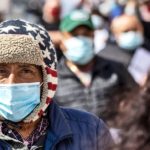 Four years following the United States’ shutdown in response to the COVID-19 pandemic, recent research conducted by Rice University sheds light on the compounded mental health struggles experienced by undocumented immigrants, largely due to the strains stemming from their unauthorized status.
Four years following the United States’ shutdown in response to the COVID-19 pandemic, recent research conducted by Rice University sheds light on the compounded mental health struggles experienced by undocumented immigrants, largely due to the strains stemming from their unauthorized status.
The study delves into the experiences of undocumented immigrants amidst the COVID-19 pandemic. Through a series of extensive interviews conducted with undocumented individuals and members of mixed-status Latino families residing along the US-Mexico border in South Texas, researchers identified four prominent stressors encountered by these individuals and their families, all of which significantly impacted mental well-being.
These stressors included:
- Anti-immigrant rhetoric and actions.
- Family-related stressors and disruptions in familial relationships.
- Economic fluctuations and financial setbacks.
- Limited access to healthcare services.
Anti-immigrant rhetoric
“Anti-immigrant rhetoric and actions have been prevalent in the US for many years, and throughout the COVID-19 pandemic, the sociopolitical climate in the US further fueled anti-immigrant discourse and policies that increased distrust and fear among families with undocumented status,” the researchers explain.
“We were disappointed to see the toll the pandemic took on these families, but it was not entirely surprising.”
Although these challenges affected many individuals during the pandemic, they were particularly distressing for families living with undocumented status, as they grappled with the constant fear of deportation due to their situation.
In light of these findings, the authors emphasize the necessity of exploring innovative approaches to tackle the intricate mental health and social needs of families facing undocumented status. Such measures are crucial for mitigating risks and averting additional harm within this vulnerable yet resilient population.
“It is essential that mental health, medical, and other allied health professionals become aware of the systemic oppression faced by Latino immigrant families, provide culturally competent services, and support policies that would increase equitable access to health services,” the authors conclude.